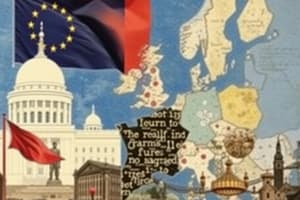Podcast
Questions and Answers
What was the primary goal of the European states after World War II concerning their international relations?
What was the primary goal of the European states after World War II concerning their international relations?
To reconstruct their relations based on principles and institutions that would promote peace and cooperation.
How did the Marshall Plan contribute to European integration?
How did the Marshall Plan contribute to European integration?
It provided massive financial aid for economic recovery, facilitating political and economic cooperation among European states.
What was NATO, and when was it established?
What was NATO, and when was it established?
NATO, the North Atlantic Treaty Organization, is a collective security alliance established in 1949.
What role did the Organisation for European Economic Cooperation (OEEC) play in post-war Europe?
What role did the Organisation for European Economic Cooperation (OEEC) play in post-war Europe?
What significant political body was created following the European Economic Community in 1957?
What significant political body was created following the European Economic Community in 1957?
What major geopolitical change in Europe around 1991 accelerated the creation of the European Union?
What major geopolitical change in Europe around 1991 accelerated the creation of the European Union?
What was the outcome of the European states' integration efforts that began after World War II?
What was the outcome of the European states' integration efforts that began after World War II?
What did the Council of Europe, established in 1949, aim to achieve?
What did the Council of Europe, established in 1949, aim to achieve?
Flashcards are hidden until you start studying
Study Notes
Historical Context
- End of the Second World War prompted discussion on the future of Europe.
- Leaders debated whether to revert to historic rivalries or forge a new cooperative framework.
Economic Reconstruction
- Post-war Europe faced economic ruin and structural collapse in state relations.
- The Marshall Plan provided significant financial aid from the US to revive European economies.
Formation of Key Organizations
- The Organisation for European Economic Cooperation (OEEC) was established in 1948 to facilitate economic cooperation among Western European states.
- NATO was formed in 1949 as a collective security structure to counter threats, particularly from the Soviet Union.
Steps Toward Integration
- The Council of Europe was established in 1949, fostering political collaboration among member states.
- Gradual economic integration led to the formation of the European Economic Community (EEC) in 1957.
Political and Economic Evolution
- The European Parliament was created, adding a political dimension to European integration.
- The end of the Soviet bloc accelerated integration processes and led to the establishment of the European Union (EU) in 1992.
Development of EU Policies
- The EU has developed a common foreign and security policy alongside justice and home affairs collaboration.
- Plans for a formal Constitution for the EU were unsuccessful, yet it established symbols of unity, such as its own flag and anthem.
Transition to a Political Union
- Originally an economic union, the EU has evolved into a politically influential entity, seeking to act like a nation-state.
- The introduction of a single currency further solidified economic ties among member states.
Studying That Suits You
Use AI to generate personalized quizzes and flashcards to suit your learning preferences.




